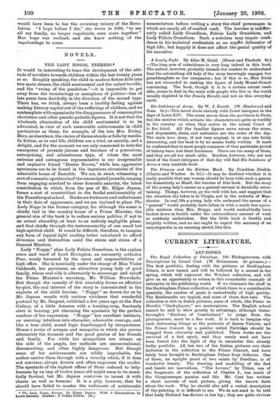NOVELS.
THE LADY NOGGS, PEERESS.*
IT would be interesting to trace the development of the atti- tude of novelists towards children within the last twenty years or so. Roughly speaking, the child in modern fiction falls into two main classes, the child sentimental and the enfant terrible, and the "awing of the pendulum "—it is impossible to get away from the terminology or metaphors of politics—has of late years been decidedly in the direction of the second type. There has, we think, always been a healthy feeling against making literary capital out of the sufferings of children, and we contemplate with equanimity the disappearance of consumptive choristers and other pseudo-pathetic figures. It is not that the wholesale elimination of the child sentimental is to be advocated, in view of such memorable achievements in child portraiture as those, for example, of the late Mrs. Ewing. Here, as elsewhere, the choice of theme stands or falls by results. In fiction, as in real life, children are a trial, an anxiety, and a delight, and for the moment we are only concerned to note the emergence of juvenile ',heroes and heroines of a 'precocious, enterprising, and adventurous, type, of whom the most extreme and outrageous representative is our irrepressible and explosive friend "Buster Brown," while less aggressive specimens are to be found in the ingenious chronicles of the admirable house of Beatable. We are, in short, witnessing a sort of romantic apotheosis of the emancipated juvenile, ranging from engaging mischief to sheer domestic anarchy, the latest contribution to which, from the pen of Mr. Edgar Jepson, forms a sort of counterblast to the feudal sentimentality of the Fauntleroyal school. Books are fortunate and unfortunate in their date of appearance, and we are inclined to place The Lady Noggs in the former category, for although the scene is chiefly laid in the country house of a Prime Minister, the general aim of the book is to reduce serious politics, if not to an actual absurdity, at least to an entirely negligible plane, and that chiefly through the instrumentality of one small but high-spirited child. It would be difficult, therefore, to imagine any form of topical light reading better calculated to afford diversion and distraction amid the storm and stress of a General Election.
Lady " Noggs," alias Lady Felicia Grandison, is the orphan niece and ward of Lord Ellington, an eminently orthodox Peer, sorely harassed by the cares and responsibilities of high office. She is nominally under the charge of Miss Violet Caldecott, her governess, an attractive young lady of good family, whose real role is alternately to encourage and rebuff the Prime Minister's secretary, Mr. William Borrodaile. But though the comedy of this courtship forms an effective by-plot, the real interest of the story is concentrated in the exploits of the child heroine. " Noggs " as drawn for us by Mr. Jepson recalls with curious vividness that wonderful portrait by Mr. Sargent, exhibited a few years ago at the New Gallery, of a little Amazon with a hunting-crop, fearlessly alert in bearing, yet charming the spectator .by the perfect candour of her expression. " Noggs " has excellent instincts, an unerring intuition into character, admirable courage, and, like a true child, sound logic handicapped by inexperience. Hence a series of scrapes and escapades in which she proves alternately the torment and the good genius of her friends and family. For while her sympathies are always on the• side of the angels, her methods are unconventional, disconcerting, and often highly dangerous. But though some of her achievements are wildly improbable, the author carries them through with a vivacity which, if it does not convince, always diverts and often engrosses the reader. The spectacle of the highest officer of State reduced to help- lessnees by an imp of twelve years old might seem to be essen- tially farcical, but Mr. Jepson contrives to invest it with charm as well as humour. It is a pity, however, that he should have failed to master the rudiments of aristocratic
The Lady Noggs, Peeress. By Edgar Jepson. With 8 Illustrations by Lewis Bauener. London: T. Fisher Unwin. Re.] nomenclature before writing a story the chief personages in Which are nearly all of exalted rank. The heroine is indiffer- ently called Lady Grandison, Felicia Lady Grandison, and Lady Felicia Grandison. ' Such a solecism may impair confi- dence in his technical credentials as an expdirt delineator of high life; but happily it does not affect the genial quality of his narrative.


































 Previous page
Previous page